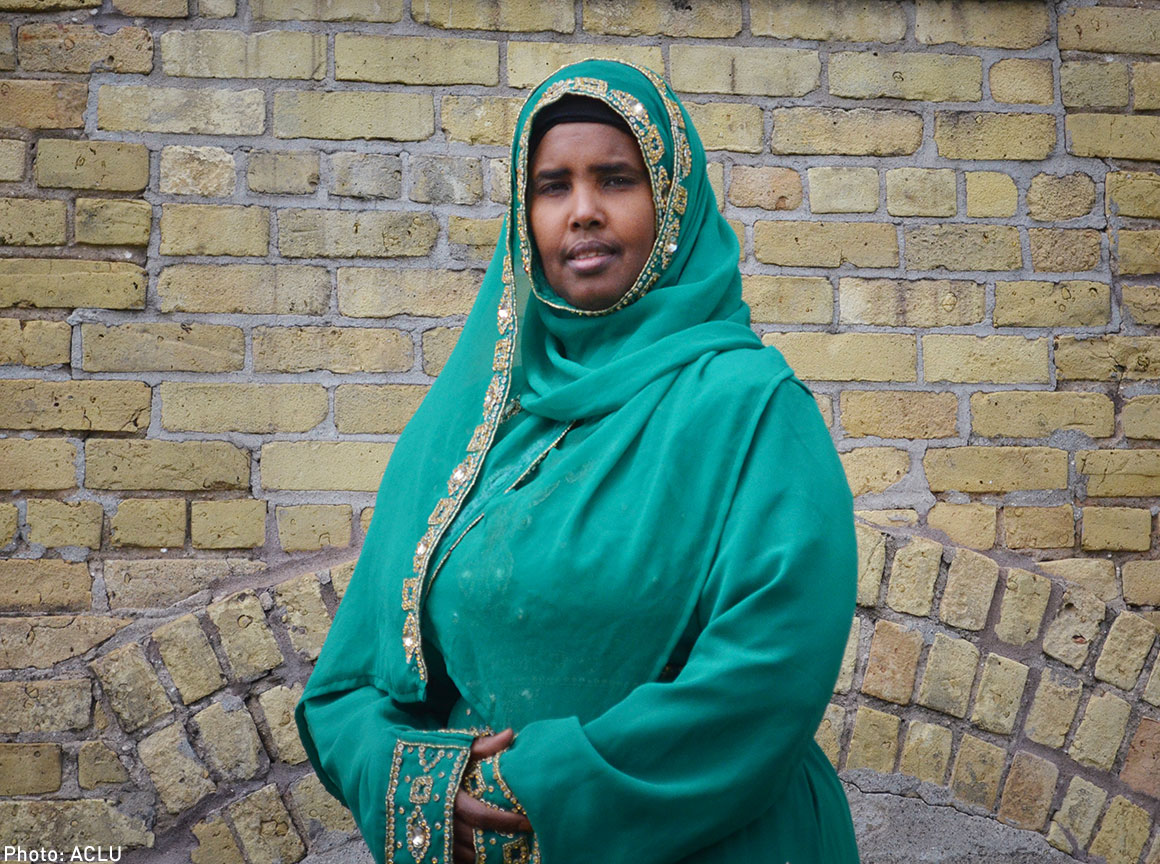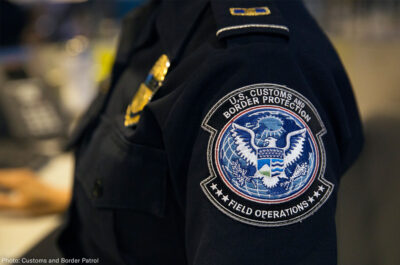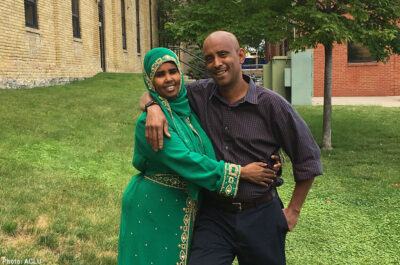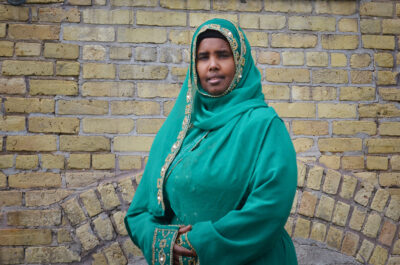
Wilwal v. Nielsen – Lawsuit Challenging Abusive Border Detention of American Family
What's at Stake
In June 2017, the ACLU filed a lawsuit on behalf of a family of U.S. citizens — including four young children — who were detained for over 10 hours at the U.S.-Canada border while coming home from a trip to visit relatives. Our clients obtained a settlement reinforcing that rights exist at the border, and also that CBP must be held accountable for violating those rights.
Summary
Abdisalam Wilwal and his family were detained because he was on the government’s terrorism watchlist, but he did not know why and saw no valid reason why he would be on the list. The lawsuit, filed in the U.S. District Court for the District of Minnesota, also challenged the lack of a meaningful process for Mr. Wilwal to contest his placement on the watchlist.
Mr. Wilwal and his wife, Sagal Abdigani, live in a Minneapolis suburb with their four children, who were 5, 6, 8, and 14 when they were detained in March 2015. Mr. Wilwal and Ms. Abdigani are originally from Somalia, which they fled due to the civil war there in the 1990s. They met in the United States after each immigrated here in 2000 and eventually became U.S. citizens and married.
On the day of the incident, the family was driving home early in the morning from a trip to see Ms. Abdigani’s sister in Saskatchewan. A few minutes after they stopped their minivan at the border station at Portal, North Dakota, U.S. Customs and Border Protection officers came out with their guns drawn. Border officers handcuffed Mr. Wilwal in front of his family, who were extremely upset and frightened. The children were screaming and crying.
As the CBP officers took Mr. Wilwal into the border station, one officer accused him of being involved with terrorism and asked if he was Muslim. Mr. Wilwal replied that he is a Muslim — and also an American citizen. The officers left him in a room for hours with nothing to eat or drink and with his hands cuffed behind his back. He eventually felt light-headed and passed out on the floor, prompting the officers to call paramedics. The officers then gave him a small glass of water but no food, and they cuffed his hands in the front instead of the back.
Several hours later, two agents from the Department of Homeland Security arrived. Mr. Wilwal asked for an attorney but was told that if he wanted to leave, he had to answer the agents’ questions. They questioned him about various topics, including his religious practices, travel, family, and job. They finally set him free with no explanation, after nearly 11 hours of detention.
Meanwhile, Ms. Abdigani and the four children were held elsewhere in the border station.
She asked if she could take the children home and come back for her husband later, or if a friend or relative on either side of the border could come to get the children. The officers refused, saying, “You’re all the same. You’re all detainees, including the children.”
Ms. Abdigani’s phone had been confiscated, but her 14-year-old son realized that he still had his phone because he hadn’t been asked to hand it over. He gave it to his mother, who called 911 and told the dispatcher that she and her family were being held against their will at the border station and feared for their safety. A CBP officer grabbed the phone and talked to the dispatcher, and the police never came.
Two CBP officers then took the 14-year-old into another room where they patted him down. They then told him to remove his clothes for a strip search, which he refused to do. A DHS document obtained by the ACLU that summarizes the incident shows that the agents also searched the contents of the boy’s phone. It also shows that the father, Mr. Wilwal, was detained because of a “record hit,” indicating that he was on a watchlist.
As soon as they returned to Minneapolis, Mr. Wilwal and Ms. Abdigani went to their local FBI and DHS offices to report what had happened. They were later told that the incident likely occurred because Mr. Wilwal was on a terrorism watchlist. They both filled out a that the government provides for people who think they are wrongly on the watchlist, but they never heard back.
After the court denied the government’s motion to dismiss the lawsuit, our clients reached a settlement agreement with the defendants. Under the settlement:
- The defendant agencies agreed to circulate notices to officers reiterating policies and rights regarding the use of force, personal searches, and detention procedures, and to further train officers on those policies and rights.
- CBP confirmed that the notation in Mr. Wilwal’s record that prompted the family’s detention will not cause anyone in the family to be subjected to heightened scrutiny — called “secondary inspection” — at the border in the future.
- CBP also confirmed that it is aware of no reason why any of the family members would experience problems returning home from abroad in the future.
- The government paid the family damages for the harms they suffered during the incident.
According to , the government uses vague criteria and a very low threshold to place people on the terrorism watchlist. The ACLU is continuing to fight government policies and programs that allow people to be placed on secret watchlists and then harassed on that basis, without a meaningful way to clear their names and get off the list.
Legal Documents
-
05/26/2020
Case Dismissed with Prejudice -
05/22/2020
Order for Dismissal with Prejudice -
05/21/2020
Stipulation of Dismissal -
04/10/2020
Redacted Findings of Fact and Order Approving Minor Settlement -
04/09/2020
Minutes on Hearing re: Petition for Approval of Minor Settlement -
03/30/2020
Notice on Hearing for Petition for Approval of Minor Settlement -
03/30/2020
Redacted Petition for Approval of Minor Settlement -
03/11/2020
Protective Order re: DHS, USCIS and HSI Internal Documents -
08/21/2019
Settlement Conference Minutes -
07/09/2019
Settlement Conference Minutes -
05/24/2019
Order Granting Defs' Continued Stay of Discovery -
05/20/2019
Defs' Motion to Stay Discovery -
05/17/2019
Protective Order -
05/09/2019
Letter to Magistrate Judge re: Protective Order -
05/09/2019
Letter to Magistrate Judge re: Negotiations -
03/28/2019
Order on Joint Stipulation to Stay Discovery -
03/25/2019
Joint Stipulation to Stay Discovery -
-
03/25/2019
Proposed Order to Stay Discovery
Proposed Order to Stay DiscoveryDate Filed: 03/25/2019
Court: District Court (D. Minn.)
-
03/25/2019
-
03/19/2019
Order -
03/08/2019
Joint Motion for Entry of Stipulated Clawback Order -
10/25/2018
Gov't Answer to Amended Complaint -
09/27/2018
Memorandum Opinion and Order -
01/24/2018
Gov't Reply in Support of Motion to Dismiss -
12/21/2017
ACLU Brief in Opposition to Gov't Motion to Dismiss -
11/08/2017
Defendants' Memorandum in Support of Motion to Dismiss -
11/08/2017
Defendants' Motion to Dismiss -
-
04/03/2018
Proposed Order
Proposed OrderDate Filed: 04/03/2018
Court: District Court (D. Minn.)
-
04/03/2018
-
10/12/2017
Amended Complaint -
07/13/2017
Complaint
Date Filed: 05/26/2020
Court: District Court (D. Minn.)
Date Filed: 05/22/2020
Court: District Court (D. Minn.)
Date Filed: 05/21/2020
Court: District Court (D. Minn.)
Date Filed: 04/10/2020
Court: District Court (D. Minn.)
Date Filed: 04/09/2020
Court: District Court (D. Minn.)
Date Filed: 03/30/2020
Court: District Court (D. Minn.)
Date Filed: 03/30/2020
Court: District Court (D. Minn.)
Date Filed: 03/11/2020
Court: District Court (D. Minn.)
Date Filed: 08/21/2019
Court: District Court (D. Minn.)
Date Filed: 07/09/2019
Court: District Court (D. Minn.)
Date Filed: 05/24/2019
Court: District Court (D. Minn.)
Date Filed: 05/20/2019
Court: District Court (D. Minn.)
Date Filed: 05/17/2019
Court: District Court (D. Minn.)
Date Filed: 05/09/2019
Court: District Court (D. Minn.)
Date Filed: 05/09/2019
Court: District Court (D. Minn.)
Date Filed: 03/28/2019
Court: District Court (D. Minn.)
Date Filed: 03/25/2019
Court: District Court (D. Minn.)
Date Filed: 03/19/2019
Court: District Court (D. Minn.)
Date Filed: 03/08/2019
Court: District Court (D. Minn.)
Date Filed: 10/25/2018
Court: District Court (D. Minn.)
Date Filed: 09/27/2018
Court: District Court (D. Minn.)
Date Filed: 01/24/2018
Court: District Court (D. Minn.)
Date Filed: 12/21/2017
Court: District Court (D. Minn.)
Date Filed: 11/08/2017
Court: District Court (D. Minn.)
Date Filed: 11/08/2017
Court: District Court (D. Minn.)
Date Filed: 10/12/2017
Court: District Court (D. Minn.)
Date Filed: 07/13/2017
Court: District Court (D. Minn.)
Press Releases
American Family Sues U.S. for Abusive Detention at Canadian Border


